Holige is one of the favorite sweets in our family and any festival or occasion is incomplete without holige in the menu.Holige is known as obbattu or poli or bobbatlu in various states of south India.Holige is very versatile when it comes to fillings while the most popular ones are Pappu Obbattu(Bele Holige) and Coconut Pol(Kayi Obbattu).I have already posted various varieties in my blog like Bele holige, Shenga Poli, Til Poli, Puran Poli to name a few but there are various other fillings one can try with like Kharjur, Dry fruits etc.
Kayi Holige or Kobbari Obbattu is prepared most commonly during occasions or festivals in Karnataka.It has longer shelf life and hence can be prepared in bulk and store it upto 10 days in refrigerator.These holiges turn slightly hard when it is cooled down but tastes delicious, one can warm them a bit on tawa or microwave to bring back the softness.It tastes delicious when served hot with a dollop of ghee.
Check out other Holige recipes in my blog:
Check out other Holige recipes in my blog:
- Chakkara Rekulu | Crispy Sugar Poli
- Garugu Hollige/ Hollige with rice flour-coconut filling
- Groundnut Holige | Shenga Holige
- Haalu Holige | Paala Poori | Paal Poli
- Hoornada Holige/Obbattu
- Pooran (Puran) Poli | Bobbatlu - Ganesh Chaturthi Special
- Sajjappa | Sojja Appalu | Halwa Poori
- Til Poli | Sesame Holige | Nuvvula Bobbatlu
Kayi Holige | Coconut Poli Recipe:
Yields: 9-10 Polis
Prep time: 30 mins | Cooking time: 30 mins | Total time: 1hr + 1 hr resting time
Cuisine: South Indian | Category: Sweets/Festival Sweets
Ingredients:
Ingredients:
Ghee/oil, to fry poli/holige
for outer layer/dough:
for outer layer/dough:
1 cup Chiroti rava(or Maida)
a pinch of Salt
1 1/2 tsp ghee, melted
1/3 cup Oil, to soak the dough
Water, to mix the dough
for filling:
1 1/2 cups grated fresh Coconut
3 tbsp Rice, soaked in water for 3 hrs
1 1/4 cup Jaggery
2 Cardamom,seeds
3 tbsp Rice, soaked in water for 3 hrs
1 1/4 cup Jaggery
2 Cardamom,seeds
Method:
for outer layer/Dough:
- Mix chiroti rawa(or maida) with a pinch of salt and ghee and add water to it and knead in to a very smooth dough. The consistency of the dough should be very loose than the regular roti dough, this is the most important step otherwise you will not get softer polis.
- Now using your fist hit the dough for few mins to get the softer dough or lift the dough and drop it hard into the bowl and repeat it until the dough becomes very smooth.
- Now place this dough in a deep vessel and pour oil over it until the dough is completely soaked in oil. Let the dough rest for a minimum of 1 hr and upto 2 hrs. Drain the excess oil and use it for other purpose.
for the filling:
- Grind soaked and drained rice, grated fresh coconut, jaggery and cardamom seeds to a fine paste. Try to grind it as fine as possible.
- Cook the mixture in the kadai until the moisture in it evaporates and becomes slightly dry.
- While the mixture is warm,make big lemon sized balls out of the mixture and arrange them in a plate.
- Cut the holige paper into a round and place it on the rolling stone which we use to roll rotis. Grease holige paper or banana leaf with oil.
- Pinch a small amla sized dough(the amount of dough should be half the quantity of the filling you take) and flatten it a bit using your hands as shown in the pics and place one ball of filling and seal it properly from all the edges like how we do for parathas.Now flatten it slowly with hands to get a thin poli. Alternatively you can roll it like parathas like how we do in between two greased transparent sheets. Adapt the method which ever is convenient for you.
- Now place the holige paper along with the poli(with poli facing down the tawa)on a hot tawa over the low flame.
- Let it sit for 20-30 seconds and now peel the holige paper gently scraping it along the edges using a spatula. See the pics to get a clear understanding of it.
- Now fry it on both sides applying ghee until light golden in color. Pour the ghee over it, do not try to spread ghee over the poli while frying it. Do not fry it for long time, it will make the polis bit hard so quickly remove it from stove when you get to see the brown patches on it.
- Repeat the process for making all polis, smear the holige paper liberally with oil and follow the same procedure.
Serve Coconut Poli hot/warm or room temperature with melted ghee.
Notes:
- Kayi holiges will not be soft once they come to room temperature.You can just warm it a bit when you serve if you want soft holige.But it tastes good either ways - soft or crispy.
- Kayi holiges can be stored easily upto a week or 10 days when refrigerated.
- We add rice to the coconut filling while grinding as it gives binding and also helps in spreading the holige uniformly and also makes the holige crispy yet soft to bite.
- You can use even Poha instead of rice in the recipe.
- You can avoid rice while grinding and instead you can add a cup of roasted gram powder(putnala podi) while frying coconut mixture(coconut + jaggery + cardamom). Even this version tastes nice.

 Vegetables
Vegetables



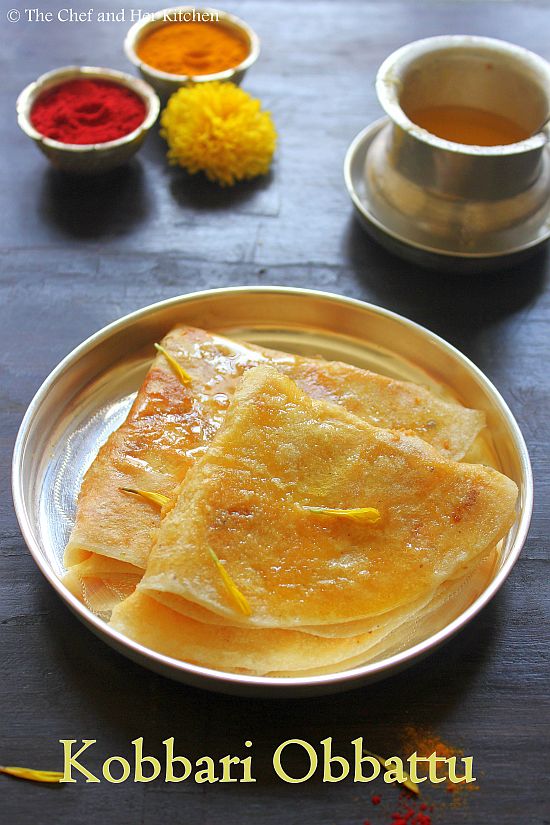
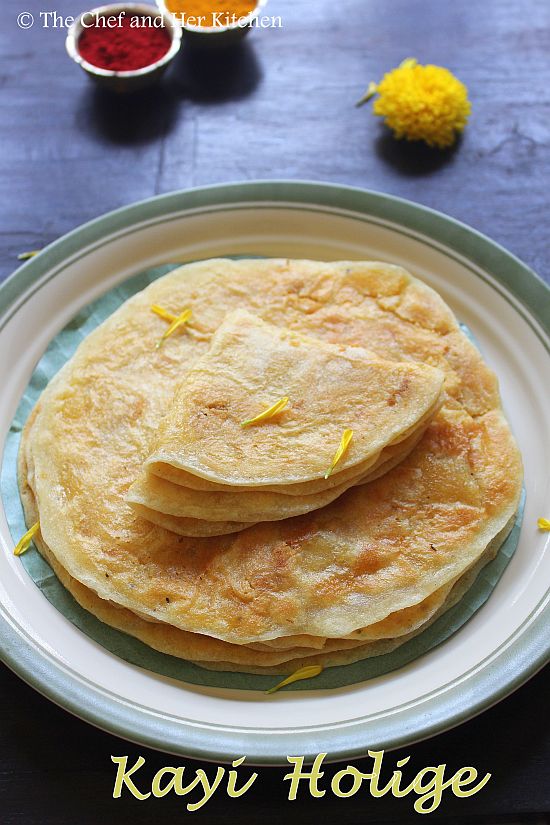
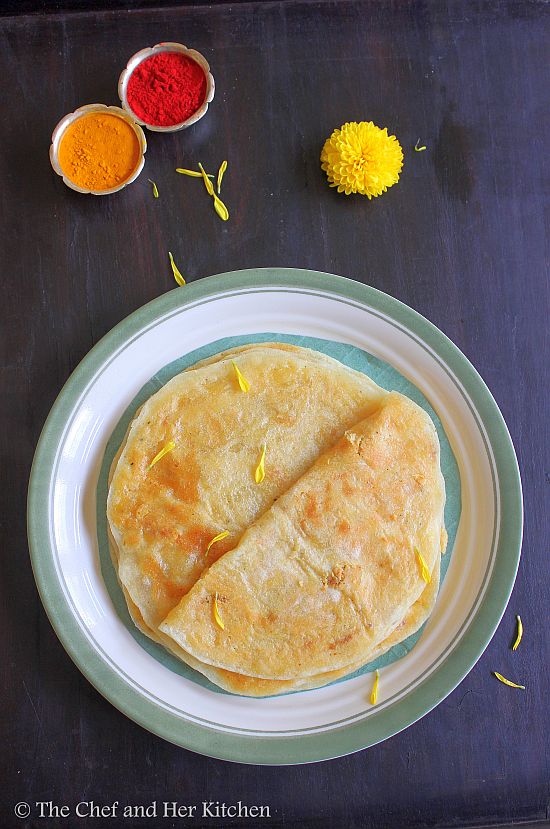
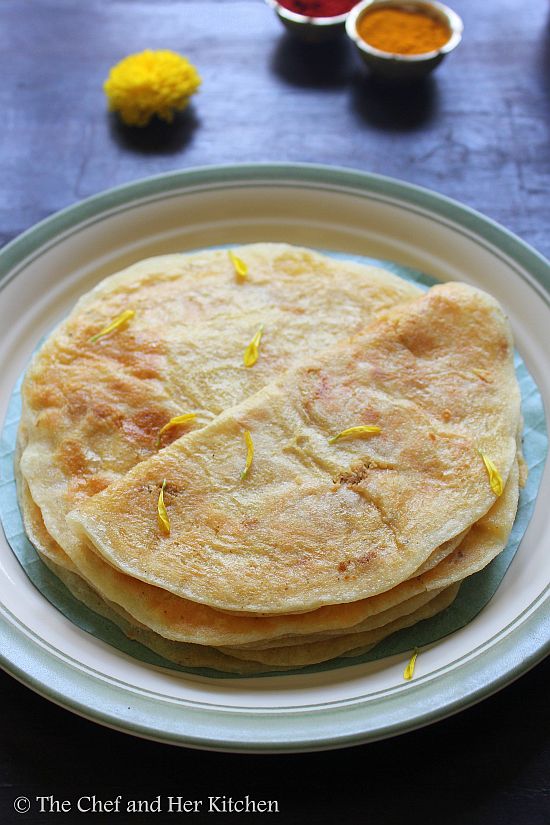
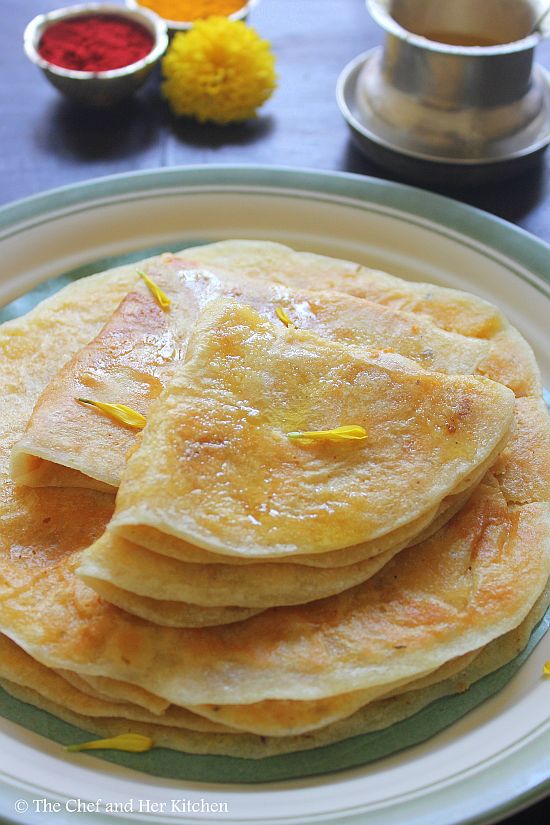




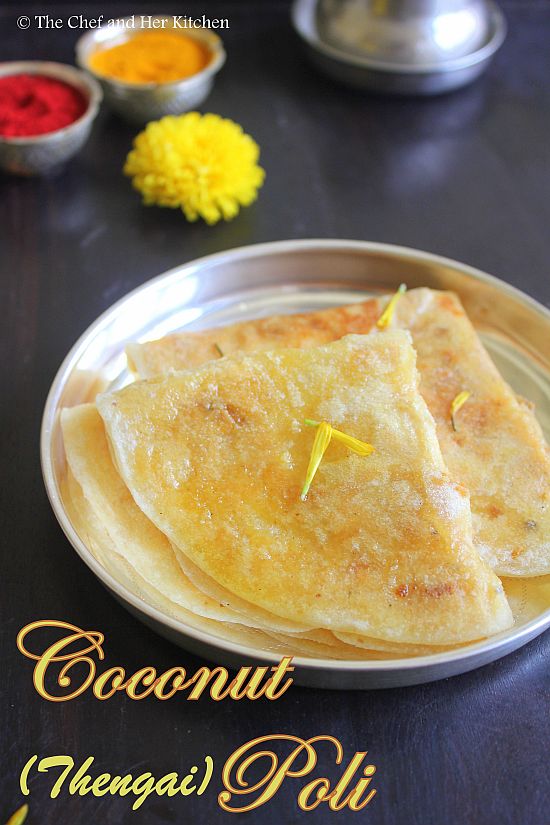






0 comments:
Post a Comment
Thank you for visiting The Chef and Her Kitchen.
Do leave your comments and feedback,they are always welcome.Please do not leave any links.
Hugs,
Prathy